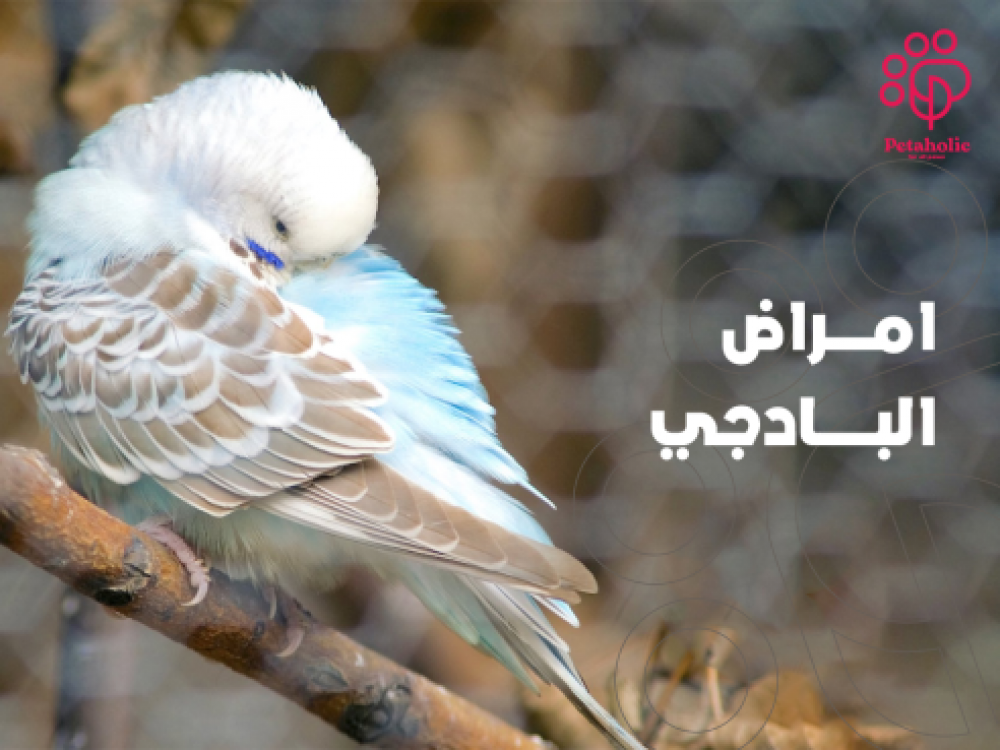
Despite spending most of their time indoors, budgerigars can be affected by various diseases. Therefore, knowing budgerigar diseases and common health problems that are likely to attack them and their symptoms will help you treat the parrot and maintain its health, which is what you will learn with us in this guide. At Petaholic, we have also provided you with all bird supplies that will help you maintain the health of your birds.
What are the most common budgerigar diseases?
The list of diseases of the badgie is as follows:
Respiratory infections
Respiratory infections are one of the most common health problems affecting budgerigars. Symptoms include coughing, sneezing, wheezing, and trouble breathing. So if you think your parrot has a respiratory infection, take him to the vet as soon as possible. Your vet may recommend antibiotics, anti-inflammatories, or anti-fungal medications to help treat the infection.
gout
Too much protein or calcium in a parrot's diet can put him at risk of gout and kidney damage. Your parrot will experience symptoms such as diarrhea, bloating, and swollen toes. After finding out the cause of the gout, your vet will prescribe appropriate medication or recommend changes in your budgie's diet.
candidiasis;
Candida, the tiny organisms responsible for this infection in birds. The disease can appear anywhere in the bird's digestive system. Common symptoms include vomiting, loose watery stools, loss of balance, and seizures. Veterinarians usually treat this disease by prescribing medications that target this infection. They may also recommend eliminating sugars from your bird's diet.
Parrot fever is one of the most common diseases of budgerigars
This disease is so common in parrots that it affects about 30% of domestic parrots and 1% of wild parrots. Birds carrying this disease usually do not show any symptoms, and it is transmitted only through their droppings and saliva. Parakeets that contract this disease will have green droppings and breathing problems. Once a bird is diagnosed with this condition, it should be isolated from other birds and closely monitored. Gafsa must also be disinfected. Your vet will likely prescribe some medication.
Warning: Parrot fever can also be transmitted to humans, so be careful when handling a sick parrot.
Goiter
Goiter, or simply iron deficiency, is manifested by a combination of signs, including neck swelling, loss of voice, labored breathing, lethargy and heart failure. A seed-based diet can increase your risk of developing a goiter. This is because the seeds will not provide them with enough iodine to promote the proper functioning of the thyroid gland. To treat a goiter, your veterinarian can prescribe sodium iodine injections or iodine supplements, and may recommend an appropriate parrot diet.
Oncology
It is common for birds to develop cancerous tumors, especially in the reproductive organs and kidneys. Older parakeets are more likely to develop testicular, ovarian, and kidney cancer. The tumors make the parakeet lame on one side, a symptom that can easily be misinterpreted as a leg injury. Additional symptoms include shortness of breath and weight loss.
mites
These tiny parasites infest budgerigars and attach themselves to feathers, skin, and even beaks. Parrots will show symptoms such as itching, scaly skin and feather loss. If your budgie has mites, your vet may prescribe an anti-parasitic medication to help fight them.
pluck
If you notice feather plucking in your parakeet, this could be an indication of an underlying health problem. Your parrot may suffer from parasites, allergies, liver disease, malnutrition, fungal bacterial infection, cancer, stress, malnutrition, and so on. If your parakeet begins to pluck its feathers, you will need to find out what is causing the behavior. If he's bored, try enriching his cage with toys and spending more time with him. Also, if he is stressed, identify and eliminate stressors around him to ensure a comfortable environment for your parrot.
Among our distinctive products that are necessary for your parrots to maintain their health and safety and prevent diseases:
How do you protect your Budgie from infection with common diseases among birds?
You can keep your budgie safe from various health problems by providing it with a healthy and balanced diet, keeping its environment clean to prevent mold and bacteria buildup, and making sure it always has access to clean, fresh water. In addition, you must provide them with opportunities for exercise and exercise to stay healthy and keep their environment safe from hazards, such as toxic materials, open windows, etc.
Taking your parrot for regular check-ups by a vet can also help you avoid any illnesses you may be missing. Your vet will be able to detect various budgerigars in their early stages and treat them before they become serious. Moreover, the vet will give you advice regarding proper feeding, care, exercise, etc. to keep your parrot healthy.
Among our essential products for the health and safety of your birds, we recommend:
Now you know the common health problems that your Budgie is likely to suffer, and the treatment options for each so you can detect these issues early and treat them before it's too late and they develop into serious complications. In Petaholic, you will also find all the supplies that provide your birds with a safe, secure and healthy environment to avoid contracting any diseases and provide the healthy lifestyle they need.
We also have:-

